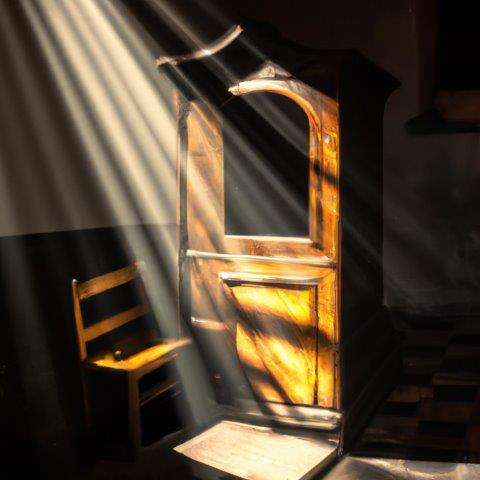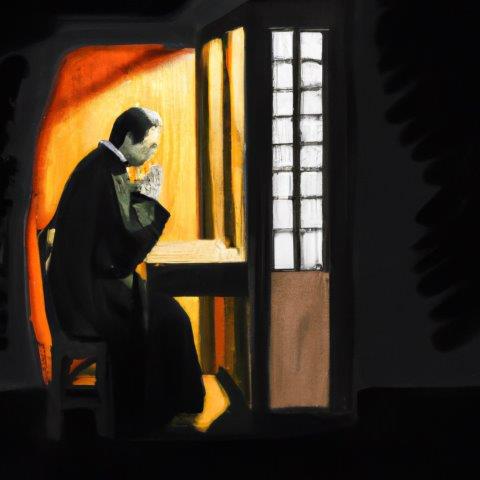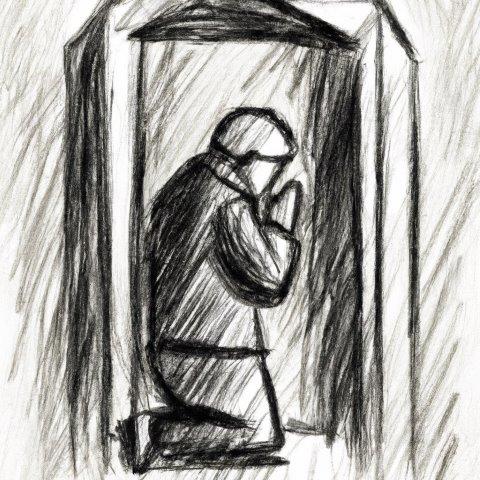Religious Education
Ultimate Guide to Catholic Reconciliation
What is Catholic Reconciliation?
Catholic reconciliation, also known as the sacrament of penance or confession, is a sacred practice in the Catholic Church. It is a sacrament that allows individuals to seek forgiveness for their sins, and to reconcile themselves with God and the Church. In this blog post, we will explore the purpose, history, preparation, and process of reconciliation.
Sacrament: Reconciliation is one of the seven Catholic sacraments:
- Baptism
- Confirmation
- Holy Eucharist (also known as First Communion)
- Penance (also known as Reconciliation or Confession)
- Anointing of the Sick (also known as Last Rites or Extreme Unction)
- Matrimony (also known as Marriage)
- Holy Orders (also known as ordination)
Purpose: The purpose of Catholic reconciliation is to seek forgiveness for sins and to restore one’s relationship with God and the Church. It is an opportunity to acknowledge one’s faults and to receive God’s grace and mercy. Through this sacrament, Catholics can experience spiritual healing and grow in their faith.
History: Reconciliation has a long history in the Church. In the early days of Christianity, penance was a public act of repentance that was done before the entire community. In the Middle Ages, the practice of private confession emerged, and by the 13th century, it had become a formal sacrament in the Catholic Church. Today, Catholic reconciliation remains an important sacrament for Catholics around the world.
Preparation: To prepare for Catholic reconciliation, individuals should take time to reflect on their actions and examine their conscience. They should acknowledge the sins they have committed, and make a firm commitment to avoid those sins in the future. It is also important to pray and ask for God’s guidance and forgiveness.
Reconciliation is an important sacrament in the Catholic Church. It is a way for individuals to seek forgiveness for their sins, and to restore their relationship with God and the Church. By preparing for the sacrament, examining their conscience, and confessing their sins to a priest, Catholics can experience spiritual healing and growth in their faith. Through reconciliation, Catholics can experience the grace and mercy of God, and renew their commitment to living a life of faith and virtue.
In some cases, the priest may offer advice or guidance on how to avoid sin in the future. The priest may also offer spiritual guidance or resources to help the penitent grow in their faith.
Catholic Confession Process
The process of Catholic reconciliation involves several steps. First, the penitent (the person seeking reconciliation) enters the confessional or reconciliation room and greets the priest. The penitent then confesses their sins to the priest, who provides guidance and counsel. The penitent may then receive a penance, which is a prayer or action that they must perform to show their commitment to avoiding sin in the future. Finally, the penitent receives absolution, which is the forgiveness of their sins.
Four Steps of Catholic Penance
Catholic reconciliation, also known as confession or the sacrament of penance, is a central aspect of Catholic faith and tradition. It is a process through which Catholics seek forgiveness for their sins and receive absolution from a priest. In this blog post, we will explore the steps and process of reconciliation.
Step 1: Examination of Conscience
The first step in Catholic reconciliation is the examination of conscience. This is a time of self-reflection in which Catholics examine their thoughts, words, and actions in light of the Ten Commandments and the teachings of the Church. This step involves taking an honest and humble look at one’s life and acknowledging any sins or areas in need of improvement.
Step 2: Confession
The second step in Catholic reconciliation is the confession of sins. This involves approaching a priest and confessing one’s sins, both mortal and venial, with sincerity and contrition. The priest serves as a representative of Christ and the Church, and offers guidance, counsel, and absolution.
Step 3: Penance
The third step in Catholic reconciliation is the penance or act of reparation. This involves performing a specific action or prayer as a sign of contrition and a willingness to make amends for one’s sins. The penance may be assigned by the priest, or may be chosen by the penitent in consultation with the priest.
Step 4: Absolution
The final step in Catholic reconciliation is absolution, or the forgiveness of sins. This is the moment in which the priest, acting in the name of Christ and the Church, pronounces the words of absolution and grants the penitent the assurance of God’s mercy and forgiveness. The penitent is then encouraged to continue their spiritual growth and renewal, striving to live a life of grace and virtue.
During the process of Catholic reconciliation, it is important to approach the sacrament with an attitude of humility, sincerity, and openness to the grace and mercy of God. It is also important to seek out a priest who is knowledgeable, compassionate, and committed to upholding the teachings of the Church. Catholics are encouraged to participate in the sacrament of reconciliation on a regular basis, as a means of staying in communion with God and the Church, and receiving the grace necessary to live a life of holiness and virtue.
Popular Gifts for Individuals Participating in Catholic Penance
Participating in Catholic reconciliation, also known as confession or the sacrament of penance, is a significant and meaningful experience for Catholics. It is an opportunity to seek forgiveness for sins and to renew one’s relationship with God and the Church. If you know someone who has recently participated in their first Catholic reconciliation, you may want to give them a gift to mark the occasion and celebrate their spiritual growth. In this blog post, we will explore some popular gift ideas for someone who has participated in their first Catholic reconciliation.
- Rosary: A rosary is a traditional Catholic prayer tool that is used to meditate on the life of Jesus and the Virgin Mary. It is a powerful symbol of faith and devotion, and a great gift for someone who has recently participated in Catholic reconciliation. There are many different styles of rosaries to choose from, including those made from precious metals, wood, and even natural stones.
- Bible or Bible Stand: A Bible is a meaningful gift for someone who has participated in Catholic reconciliation. It is a source of guidance and inspiration for Catholics, and can help deepen one’s understanding of the faith. There are many different translations and editions of the Bible to choose from, including study Bibles that provide additional context and commentary. If the recipient already owns a bible, you can gift them with a personalized bible stand to hold their bible proudly in the center of their home.
- Religious Jewelry: Religious jewelry, such as a crucifix necklace or a medal of a saint, is a great gift for someone who has participated in Catholic reconciliation. It is a tangible symbol of faith that can be worn as a reminder of one’s spiritual journey. There are many different styles of religious jewelry to choose from, including those made from precious metals and gemstones.
- Spiritual Books: Spiritual books can be a great way to support someone who has participated in Catholic reconciliation. There are many different books available that provide guidance and inspiration for Catholics, such as books on prayer, saints, and the sacraments. Some popular options include “The Confessions” by St. Augustine, “The Imitation of Christ” by Thomas a Kempis, and “The Interior Castle” by St. Teresa of Avila. Religious Bookends help readers display their books in an organized and esthetic fashion.
- Prayer Journal: A prayer journal is a great gift for someone who has participated in Catholic reconciliation. It can be used to record prayers, reflections, and spiritual insights, and can help deepen one’s relationship with God. There are many different types of prayer journals available, including those with prompts and those with blank pages.
Participating in Catholic reconciliation is a significant and meaningful experience for Catholics. If you know someone who has recently participated in their first Catholic reconciliation, consider giving them a gift to mark the occasion and celebrate their spiritual growth. Some popular gift ideas include a rosary, Bible, religious jewelry, spiritual books, and a prayer journal. These gifts can help support and inspire the recipient on their spiritual journey, and serve as a reminder of the grace and mercy of God.
Top Catholic Reconciliation Gifts
Medals and Pendants
Crosses & Crucifixes
Patron Saints - F's
Crucifix Pendants
How Can Catholic Prepare for Reconciliation?
The Sacrament of Reconciliation, also known as Confession or Penance, is a sacrament in the Catholic Church where believers confess their sins to a priest and receive absolution. This sacrament is an important part of the Catholic faith, as it offers believers the opportunity to repent of their sins and receive God’s forgiveness. In this blog post, we will explore how Catholics can prepare for the Sacrament of Reconciliation.
-
Reflect on your sins
The first step in preparing for the Sacrament of Reconciliation is to reflect on your sins. Spend some time in prayer, asking God to help you recognize your sins and bring them to mind. Think about your thoughts, words, and actions that have been contrary to God’s will, and make a list of them.
-
Examine your conscience
Once you have reflected on your sins, it’s time to examine your conscience. This is a process where you evaluate your actions and motives to determine if they were sinful or not. You can use a guide to help you with this process, such as the Ten Commandments or the Beatitudes. Reflect on each commandment or beatitude and ask yourself if you have kept it or if you have sinned against it.
-
Make a good confession
When you go to confession, it’s important to make a good confession. This means confessing all of your sins to the priest, including any mortal sins, which are sins that are serious and can separate you from God. It’s important to be honest and sincere in your confession, and to not hold anything back.
-
Show contrition
Contrition is a key element of the Sacrament of Reconciliation. This means that you must be sorry for your sins and have a true desire to change your ways. When you confess your sins to the priest, express your sorrow and ask for God’s forgiveness.
-
Receive absolution
Absolution is the act of forgiveness given to you by the priest in the name of God. After you have confessed your sins and shown contrition, the priest will absolve you of your sins. The priest will then give you a penance, which is a prayer or action that you must perform as a way of making amends for your sins.
-
Follow through with your penance
It’s important to follow through with the penance that the priest gives you after your confession. This penance is a way of showing your commitment to changing your ways and making amends for your sins. It may involve saying a prayer or performing an act of charity.
In conclusion, preparing for the Sacrament of Reconciliation involves reflection, examination of conscience, making a good confession, showing contrition, receiving absolution, and following through with your penance. This sacrament is a powerful way to receive God’s forgiveness and to begin anew. By following these steps, Catholics can prepare themselves to receive this sacrament and to experience the transformative power of God’s mercy and love.
Common Questions About Reconciliation
Reconciliation, also known as confession or penance, is an essential sacrament in the Catholic Church. It is a sacrament of healing and forgiveness, allowing Catholics to receive absolution for their sins and reconcile with God and the Church. However, many people have questions and concerns about the process and purpose of confession. In this blog post, we will address some of the most common questions about reconciliation in the Catholic Church.
What is the purpose of confession?
The purpose of confession is to receive forgiveness for sins committed after baptism. Through confession, we acknowledge our sins and ask God for forgiveness. The sacrament also allows us to reconcile with the Church and the community of believers.
Why do I have to confess my sins to a priest?
In the Catholic Church, confession is done through a priest who acts as a mediator between the penitent and God. This tradition has its roots in Scripture, where Jesus gave his disciples the authority to forgive sins (John 20:22-23). The priest serves as a representative of the Church and of Christ, who forgives sins through the priest.
What happens if you confess something embarrassing or dangerous (like killing someone)?
Confessions are subject to the seal of confession, which means that priests cannot reveal what is confessed to them. This applies even if the confession involves something illegal or dangerous. The only exception to this rule is if the penitent explicitly gives permission for the information to be shared.
How are sins absolved?
Sins are absolved through the prayer of absolution, which is spoken by the priest at the end of the confession. The prayer asks God to forgive the sins and grants absolution to the penitent.
Can I receive Communion without going to Confession?
In order to receive Communion, Catholics are required to be in a state of grace, meaning they have confessed and been absolved of any mortal sins. Therefore, if a person has committed a mortal sin, they must go to confession before receiving Communion.
How often should Catholics confess their sins?
Catholics are encouraged to confess their sins regularly, especially if they have committed mortal sins. While there is no set rule for how often to confess, the Church recommends confession at least once a year during Lent.
Are my confessions confidential?
 Confessions are absolutely confidential. Priests are bound by the seal of confession and cannot reveal what is confessed to them under any circumstances. This ensures that penitents can confess their sins in complete privacy and without fear of judgment or repercussions.
Confessions are absolutely confidential. Priests are bound by the seal of confession and cannot reveal what is confessed to them under any circumstances. This ensures that penitents can confess their sins in complete privacy and without fear of judgment or repercussions.
Reconciliation is a crucial sacrament in the Catholic Church, allowing Catholics to receive forgiveness for their sins and reconcile with God and the Church. Through the mediation of a priest, penitents are able to confess their sins and receive absolution. It is important to remember that confession is a private and confidential sacrament, and that priests are bound by the seal of confession. By regularly participating in the sacrament of reconciliation, Catholics can continue to grow in their faith and deepen their relationship with God.
What does the Catechism of the Catholic Church Teach About Reconciliation?
The Catechism of the Catholic Church teaches that the sacrament of reconciliation, also known as confession or penance, is an essential aspect of the Catholic faith. The Catechism teaches that reconciliation is a sacrament of healing, in which a person confesses their sins to a priest and receives absolution for those sins.
The Catechism emphasizes that reconciliation is not simply a matter of confessing one’s sins and receiving forgiveness, but also involves a conversion of heart and a commitment to avoid sin in the future. The Catechism states, “The confession of sins, even from a simply human point of view, frees us and facilitates our reconciliation with others. Through such an admission, man looks squarely at the sins he is guilty of, takes responsibility for them, and thereby opens himself again to God and to the communion of the Church” (CCC 1455).
The Catechism also teaches that the priest is a necessary mediator in the sacrament of reconciliation, as he acts in the person of Christ to offer absolution for sins. The Catechism explains, “Only God forgives sins. Since he is the Son of God, Jesus says of himself, ‘The Son of man has authority on earth to forgive sins’ and exercises this divine power: ‘Your sins are forgiven.’ Further, by virtue of his divine authority he gives this power to men to exercise in his name” (CCC 1441).
The Catechism also addresses the frequency with which Catholics should confess their sins, stating that Catholics are required to confess their mortal sins at least once a year. However, the Catechism encourages Catholics to confess their sins more frequently, as regular confession can help to foster spiritual growth and deepen one’s relationship with God.
Overall, the Catechism emphasizes the importance of the sacrament of reconciliation as a means of healing and reconciliation with God and the Church, and encourages Catholics to approach the sacrament with a spirit of humility, contrition, and openness to God’s grace.
Top 5 Saints Associated with Penance and Reconciliation
 Saints are revered as models of faith and holiness. They serve as examples of how to live a life in accordance with God’s will, and they offer inspiration for those seeking guidance on their spiritual journey. Among the many saints recognized by the Church, there are some who are particularly known for their devotion to penance and reconciliation. Though many saints lived reverent and penitential lives, here are the top 5 penitential saints:
Saints are revered as models of faith and holiness. They serve as examples of how to live a life in accordance with God’s will, and they offer inspiration for those seeking guidance on their spiritual journey. Among the many saints recognized by the Church, there are some who are particularly known for their devotion to penance and reconciliation. Though many saints lived reverent and penitential lives, here are the top 5 penitential saints:
-
St. Francis of Assisi: Perhaps one of the most famous saints in the Catholic tradition, St. Francis of Assisi is known for his radical commitment to poverty and his love of all of God’s creatures. He is also recognized for his devotion to penance, often fasting and praying for extended periods of time as a way to purify himself and draw closer to God. He is known for his famous quote, “Start by doing what is necessary; then do what is possible; and suddenly you are doing the impossible.”
-
St. Mary of Egypt: St. Mary of Egypt is a lesser-known saint who lived during the 5th century. She is celebrated for her extreme penitential practices, including living as a hermit in the desert for 47 years, eating only plants and fruits, and praying constantly. According to legend, she was granted forgiveness for her past sins after experiencing a miraculous encounter with the Holy Cross.
-
St. Padre Pio: St. Padre Pio was a 20th-century Italian priest who is revered for his gift of healing and his ability to read hearts. He is also known for his devotion to the sacrament of reconciliation, often spending hours in the confessional hearing confessions. He is said to have had a deep understanding of the human heart and a profound ability to help people find healing and forgiveness.
-
St. Teresa of Avila: St. Teresa of Avila was a 16th-century Spanish mystic and writer who is celebrated for her spiritual insights and her advocacy for reform within the Church. She is also recognized for her deep commitment to penance, often fasting and practicing other forms of self-denial as a way to deepen her relationship with God. She famously wrote, “Let nothing disturb you, let nothing frighten you, all things are passing away: God never changes.”
-
St. John Vianney: St. John Vianney, also known as the Cure of Ars, was a 19th-century French priest who is recognized for his deep commitment to the sacrament of reconciliation. He spent long hours in the confessional hearing confessions and is said to have had a profound understanding of human weakness and the need for repentance and forgiveness. He is a patron saint of priests and his feast day is celebrated on August 4th.
In addition to these saints, there are countless others who have dedicated their lives to the pursuit of penance and reconciliation. Their lives serve as a reminder of the importance of repentance and the transformative power of God’s forgiveness.
What is the Rite of Reconciliation?
The following is typically the process of how the sacrament of reconciliation is performed between the participant and the priest:
Priest: In the name of the Father, and of the Son, and
of the Holy Spirit. Amen.
Penitent: Bless me Father, for I have sinned. It has
been (how long?) since my last confession, and these
are my sins: (confess your sins).
Priest: (Gives you a penance)
Penitent: (Pray the Act of Contrition):
Oh My God, I am heartily sorry for having offended
You and I detest all of my sins because of Your just
punishment, but most of all, because they offend You,
my God, Who are all good and deserving of all of my
love. I firmly resolve with the help of Your grace, to
sin no more, and to avoid the near occasion of sin.
Amen.
Priest: (gives you absolution)
Priest: Give thanks to the Lord, for He is Good.
Penitent: For His mercy endures forever.
or:
Priest: Go in peace. Penitent: Thanks be to God.)
Penitent: recite or do your penance as soon as possible.
History of the Act of Contrition
The Act of Contrition is a prayer recited by Catholics during the sacrament of Penance or Reconciliation. Its origins are unclear, but it is believed to have developed over time through the influence of various Christian traditions.
One of the earliest forms of the Act of Contrition can be found in the early Christian practice of public penance. This involved confessing one’s sins openly in front of the entire congregation and performing acts of penance as a form of restitution. Over time, this practice evolved into the private confession of sins to a priest and the recitation of prayers as a form of penance.
The earliest known form of the Act of Contrition dates back to the 6th century and was attributed to Pope St. Leo the Great. It was recited during the penitential procession on Ash Wednesday and included a confession of sins and a plea for forgiveness.
Over the centuries, various forms of the Act of Contrition emerged in different regions and traditions. In the 16th century, the Council of Trent standardized the form of the Act of Contrition used in the Latin Rite of the Catholic Church, which includes a statement of sorrow for sins committed and a commitment to avoid sin in the future.
Today, the Act of Contrition remains an important part of the Catholic sacrament of Penance and is considered a necessary component of the sacrament for the forgiveness of sins.
Prayers for Individuals Preparing to Receive the Sacrament of Reconciliation
Sacrament of Reconciliation Prayer for Mercy
Dear Lord, as I come before you in the sacrament of reconciliation, I ask for your mercy and forgiveness. I am sorry for the times when I have turned away from your love and chosen sin. I ask for the grace to truly repent and turn my heart back towards you. Help me to grow in humility and trust, so that I may always seek your will and follow your ways. May this sacrament of healing and reconciliation strengthen my faith and deepen my love for you. Amen.
Sacrament of Penance Prayer for Guidance
Heavenly Father, as I prepare to receive the sacrament of reconciliation, I pray for the guidance of the Holy Spirit. Help me to examine my conscience honestly and with a contrite heart. Grant me the strength to confess my sins with humility and sincerity, knowing that you are always ready to forgive and welcome me back into your loving embrace. May this sacrament of reconciliation renew my spirit and empower me to live a life of grace and holiness. Amen.
Sacrament of Confession Prayer for Forgiveness
Dear Lord, I come before you in the sacrament of reconciliation, seeking your mercy and forgiveness. I know that I have sinned and fallen short of your glory, but I trust in your infinite love and mercy. Help me to truly repent and turn away from sin, so that I may become a faithful disciple of Christ. I pray for the grace to live in the light of your truth, and to be a witness of your love and mercy to others. May this sacrament of reconciliation renew my spirit and strengthen my resolve to live a life of holiness. Amen.
Spiritual Reflection on the Sacrament of Confession
The sacrament of reconciliation is a powerful encounter with the mercy and love of God. As we prepare to receive this sacrament, we are invited to examine our conscience and acknowledge the times when we have turned away from God’s love and chosen sin. It can be a difficult and humbling process, but it is also a necessary step in our spiritual growth and renewal. Through this sacrament, we are given the grace to repent and turn back towards God, to receive his forgiveness and to be reconciled to him and to our brothers and sisters in Christ. Let us approach this sacrament with a contrite heart, and trust in God’s infinite love and mercy. May we be transformed by his grace and empowered to live a life of holiness and joy.










